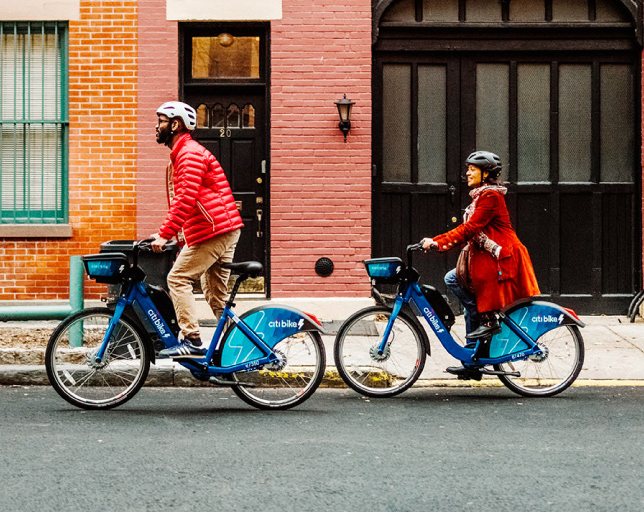Citi Bike E-Bikes Return Today — And Pressure Will Build on De Blasio to Expand System More

Citi Bike electric bikes return today — and now the pressure will be on the de Blasio administration to bring the game-changing form of transportation to a wider segment of the city.
For the first time since all e-bikes were pulled last April, the Lyft-owned company will start deploying a few hundred battery-powered bikes to the nation’s largest bike share system, with a goal of “several thousand” pedal-assist bikes hitting the street by the end of the summer, a company spokesman said.
The return of the redesigned Citi Bike e-bike is crucial as the system begins its 2020-23 expansion into the Bronx, Upper Manhattan and a wider segment of western Queens and central Brooklyn.
The de Blasio administration does not commit any public money to this sustainable, climate-friendly, congestion-reducing system — one that often handles 90,000 trips per day (roughly six times the mayor’s highly subsidized ferry system). As a result, fewer areas are currently slated to get Citi Bike — and neighborhoods such as Bay Ridge, Borough Park, Hunts Point, Maspeth, Elmhurst and Riverdale are not even slated to join the bike-share network until 2024 at the earliest.
In a city whose mayor says he is committed to reducing car use, electric Citi Bikes — which eases longer commutes — are a natural. Yet City Hall declined to comment on why the de Blasio administration refuses to use public funds to quicken the pace of Citi Bike expansion.
Advocates say public funding is long overdue.
“It’s been nearly seven years since Citi Bike launched, and yet the bike share network still fails to serve most of New York City,” said Transportation Alternatives Executive Director Danny Harris. “We need our elected leaders to commit the necessary support to expand this critical component of the transit system for the benefit of all New Yorkers.”
Activist Macartney Morris was quick to point out that de Blasio’s NYPD continues to crack down on delivery workers who use a different form of electric bike — an irony that will become more glaring starting today.
“Even before the advent of Citi Bike-branded ebikes, ebikes has long been a game changer for tens of thousands of delivery workers who keep this city fed,” he said. “Their use of ebikes — instead of more dangerous cars and trucks — should be applauded and celebrated, not policed and criminalized. No ebike rider should be ticketed or harassed—whether the ebike they are riding is personally owned or is owned by Lyft and sponsored by a big bank.
“Bike share is a public utility and should be operated as such,” Morris added. “The original sin, if you will, was Mayor Bloomberg’s … refusal to subsidize [bike share]. That Mayor de Blasio continued and exacerbated this neoliberal folly is ironic, to say the least.”
Regardless of the city’s laissez-faire stance towards a vital part of the public transportation system, the return of electric Citi Bikes will be big news for the system’s 150,000 annual members, plus tens of thousands of casual users such as tourists. The bikes were used roughly three times as frequently as “classic” Citi Bikes when they were on the street from August, 2018 until April, 2019, when they were pulled from the streets after some users were thrown over the handlebars due to front brake problems. (The brakes are redesigned and the motor is now in the back.)

About 250 e-bikes will start showing up today, initially at docks in Queens and Brooklyn near bridges. They will quickly spread by osmosis into the entire system as they are used. By the end of the “peak riding season,” there will be “several thousand” electric Citi Bikes available, a company spokeswoman said. By the end of the summer, the South Bronx and more of Upper Manhattan will be home to Citi Bike docks.
The pricing scheme remains the same as Citi Bike announced last year: Members, who already pay $169 per year, will be charged 10 cents per minute to use electric Citi Bikes. But the total extra charge will be capped at $2 if the ride begins or ends outside of Manhattan (Manhattanites can console themselves in the knowledge that very few electric Citi Bike trips in the current Citi Bike zone would take more than 20 minutes).
Non-members will be charged 15 cents per minute. Members of the Reduced Fare Bike Share program will pay 5 cents per minute.
The fees will cover the additional “operating costs” of deploying bikes whose batteries, which drain after about 30 miles of flat cycling, need to be swapped out by company workers.
Those operating costs are also paid by Lyft, not the city. And that’s why advocates say de Blasio’s failure causes harm in two ways.
“The slow pace at which Citi Bike has expanded is not only an equity issue, as many neighborhoods that would benefit the most from low-cost transportation are still waiting, but that street safety projects like protected bike lanes are even further away, as the critical mass needed to garner city attention lags behind,” said Brian Howald, a regular Citi Bike user and creator of the Howsmydrivingny.nyc database.





